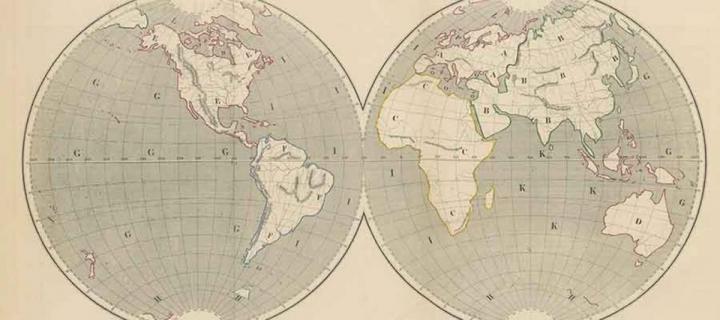Innovating in digital and open education
Digital Education experts have transformed online, distance learning within and beyond the University of Edinburgh, creating vibrant networks of learners around the world participating in Massive Open Online Courses (MOOCs).

Research hub
Digital Education
Research experts
Research centre
Centre for Research in Digital Education
What was the problem?
Easy access to digital environments has changed the face of distance learning, especially during the Covid-19 pandemic. Being able to deliver a course or programme on the internet means that educators can now reach much larger, and more geographically dispersed, groups of students than is possible in a fixed, campus space.
The challenge in teaching at a global scale is in fostering a sense of collegiality, where learners feel part of a supportive and responsive community. This is true of the University’s entirely web-based postgraduate programmes and also of the free, high-profile short courses education providers have been running in recent years: Massive Open Online Courses (MOOCs).
What did we do?
Building on our research expertise in online and distance learning, the Digital Education centre at Moray House School of Education and Sport developed one of the first UK MOOCs early in 2013. Launching on the Coursera platform, the course has now run three times with over 70,000 enrolled learners. The E-learning and Digital Cultures MOOC (EDCMOOC) invited participants to think critically and creatively about digital education, both as a process and as a topic of study.
The course was aimed at teachers, learning technologists, education policymakers and people with a general interest in online learning. Moving away from video lectures, it instead provided participants with online access to resources in a range of formats, including film, and asked them to reflect on their learning through blogs, images and other digital media.
One of the most innovative aspects of the course was the emphasis placed on participants’ use of social media to build learning networks and share experiences and ideas. By the time the MOOC ran for the third and final time in spring 2015, this concept had been developed to provide learners with an automated, Twitter-based tutor known as "teacherbot", a playful experiment in human and non-human co-teaching.
The development of creative, critical and social approaches to learning at scale was particularly innovative.
As open education expanded through the emergence of MOOCs in the early 2010s, many universities became able to engage very large numbers of diverse online learners. In this context, Bayne and Ross mapped the UK MOOC landscape and developed robust strategic frameworks for designing high quality open teaching.
Subsequently, Knox’s research critically interrogated “open education” itself as an ethos and strategic practice, examining many of the problematic social, economic and political implications for universities engaging with open education, including the new platform partnerships and business models associated with it.
What happened next?
E-learning and Digital Cultures (EDCMOOC) was a practical exploration of the potential of digital teaching and learning, combining the research, development and knowledge exchange expertise of the Digital Education centre. The emphasis placed on strong social networks for learning at massive scale was particularly innovative.
Our work helped expand MOOC curricula globally into the arts, humanities and social sciences, while innovative and high-quality digital pedagogies developed through our research were influential in the trajectory of the MOOC movement. We have modelled MOOC pedagogy in the 53 MOOCs the University of Edinburgh has offered since 2013, reaching more than 3,000,000 learners who directly benefited from this work through participation in our courses. The University of Edinburgh now offers a broad suite of MOOCs, several of which are delivered in partnership with external organisations.
A number of these collaborative MOOCs have involved the Digital Education centre; The Warhol MOOC was co-developed as part of Edinburgh College of Art’s ARTIST ROOMS Research Partnership with Tate and the National Galleries of Scotland. With 26,000 sign-ups, this has been one of the most successful arts-based MOOCs to date.
The centre has also worked with the Education team within National Museums Scotland to develop its first ever MOOC, Photography: A Victorian Sensation, coinciding with its major summer 2015 exhibition of the same name.
Following an employee’s positive experience of EDCMOOC, the World Bank approached the Digital Education centre to advise on its first MOOCs on climate change and development. Research by Bayne, Ross and Knox underpinned the design of the World Bank’s first MOOC in 2014. Since then, “Turn down the heat: why a 4 degree warmer world must be avoided” has reached 39,000 learners in more than 180 countries. The Centre then helped the organisation replicate this pioneering course design throughout its subsequent MOOCs, with thousands of learners enrolled on their Open Learning Campus.
Through a six-month Fellowship in 2013-14, we helped the Scottish Parliament instigate a MOOC on wellbeing, which is now being taken forward with colleagues in the School of Social and Political Science.
Working with the Open University’s private enterprise, Futurelearn, and the UK Higher Education Academy (now known as AdvanceHE), the Digital Education centre has shared knowledge on the MOOC landscape at a critical point where development and take-up of open courses. This has built capacity within the organisations themselves, and within a wider, international network of policymakers and practitioners.
In these ways, the Centre for Digital Education’s work has broadened curricula, enhanced pedagogy and increased capacity in the learning opportunities available through MOOCs.

